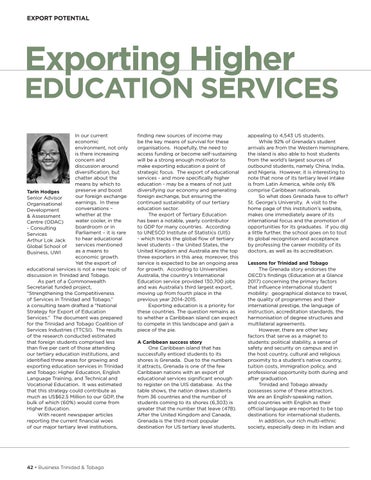EXPORT POTENTIAL
Exporting Higher
EDUCATION SERVICES In our current economic environment, not only is there increasing concern and discussion around diversification, but chatter about the means by which to preserve and boost Tarin Hodges our foreign exchange Senior Advisor earnings. In these Organisational conversations – Development whether at the & Assessment water cooler, in the Centre (ODAC) boardroom or in - Consulting Parliament – it is rare Services to hear educational Arthur Lok Jack services mentioned Global School of as a means to Business, UWI economic growth. Yet the export of educational services is not a new topic of discussion in Trinidad and Tobago. As part of a Commonwealth Secretariat funded project, “Strengthening the Competitiveness of Services in Trinidad and Tobago,” a consulting team drafted a “National Strategy for Export of Education Services.” The document was prepared for the Trinidad and Tobago Coalition of Services Industries (TTCSI). The results of the research conducted estimated that foreign students comprised less than five per cent of those attending our tertiary education institutions, and identified three areas for growing and exporting education services in Trinidad and Tobago: Higher Education, English Language Training, and Technical and Vocational Education. It was estimated that this strategy could contribute as much as US$62.5 Million to our GDP, the bulk of which (60%) would come from Higher Education. With recent newspaper articles reporting the current financial woes of our major tertiary level institutions,
42 • Business Trinidad & Tobago
finding new sources of income may be the key means of survival for these organisations. Hopefully, the need to access funding or become self-sustaining will be a strong enough motivator to make exporting education a point of strategic focus. The export of educational services - and more specifically higher education - may be a means of not just diversifying our economy and generating foreign exchange, but ensuring the continued sustainability of our tertiary education sector. The export of Tertiary Education has been a notable, yearly contributor to GDP for many countries. According to UNESCO Institute of Statistics (UIS) - which tracks the global flow of tertiary level students – the United States, the United Kingdom and Australia are the top three exporters in this area; moreover, this service is expected to be an ongoing area for growth. According to Universities Australia, the country’s International Education service provided 130,700 jobs and was Australia’s third largest export, moving up from fourth place in the previous year 2014-2015. Exporting education is a priority for these countries. The question remains as to whether a Caribbean island can expect to compete in this landscape and gain a piece of the pie. A Caribbean success story One Caribbean island that has successfully enticed students to its shores is Grenada. Due to the numbers it attracts, Grenada is one of the few Caribbean nations with an export of educational services significant enough to register on the UIS database. As the table shows, the nation draws students from 36 countries and the number of students coming to its shores (6,303) is greater that the number that leave (478). After the United Kingdom and Canada, Grenada is the third most popular destination for US tertiary level students,
appealing to 4,543 US students. While 92% of Grenada’s student arrivals are from the Western Hemisphere, the island is also able to host students from the world’s largest sources of outbound students, namely China, India, and Nigeria. However, it is interesting to note that none of its tertiary level intake is from Latin America, while only 6% comprise Caribbean nationals. So what does Grenada have to offer? St. George’s University. A visit to the home page of this institution’s website, makes one immediately aware of its international focus and the promotion of opportunities for its graduates. If you dig a little further, the school goes on to tout its global recognition and acceptance by professing the career mobility of its doctors, as well as its accreditation. Lessons for Trinidad and Tobago The Grenada story endorses the OECD’s findings (Education at a Glance 2017) concerning the primary factors that influence international student mobility: geographical distance to travel, the quality of programmes and their international prestige, the language of instruction, accreditation standards, the harmonisation of degree structures and multilateral agreements. However, there are other key factors that serve as a magnet to students: political stability, a sense of safety and security on campus and in the host country, cultural and religious proximity to a student’s native country, tuition costs, immigration policy, and professional opportunity both during and after graduation. Trinidad and Tobago already possesses some of these attractors. We are an English-speaking nation, and countries with English as their official language are reported to be top destinations for international students. In addition, our rich multi-ethnic society, especially deep in its Indian and
